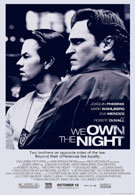James Gray doesn’t usually make the list of iconic New York filmmakers, but in all of the three films of his Hollywood career, he’s pointed his camera at some of the seamiest, and most fascinating, corners of the five boroughs. His previous two films, 1994’s Little Odessa and 2000’s The Yards, explored the middle class and ethnic boroughs of Brooklyn and Queens, respectively, with unusual depth and attention to detail. A child of Brooklyn, Gray sticks to what he knows and likes.
With his latest, We Own The Night, Gray is back in familiar territory both geographically and thematically. Spanning the two westernmost counties of Long Island, the film again tackles family dyamics and the thin line between crime and the law; happily, though, Gray isn’t just making a retread, and We Own The Night brims with raw feelings and elegant filmmaking that makes even a very familiar story seem fresh.
It’s the late 1980s in New York, the peak of the city’s crime wave, when the police struck back at the criminals with the motto “We Own the Night.” Brothers Bobby (Joaquin Phoenix) and Joseph (Mark Wahlberg) have split to opposite sides of the boroughs, with Bobby managing a Russian-owned nightclub in Brighton Beach and Joseph and his father Bert (Robert Duvall) the stalwarts of a Queens police precinct. Bobby has deliberately estranged himself from his family, hooking up with Amada, a Latina club girl (Eva Mendes), and adopting the Russian gangsters who own the club as a surrogate family. When Joseph and Bert ask his help in conducting a sting on one of the heroin dealers operating out of his club, Bobby balks until the gangsters retaliate against Joseph. Forced by familial loyalty back into the fold, Bobby joins his father and brother’s fight, sacrificing nearly everything in the process.
The genre staples run deep here, from Bobby’s moment of reconciliation with the police force to a tense sting operation gone wrong. Gray’s attention to detail shines through constantly, though, from the polyglot of languages spoken in Bobby’s club to the quiet moments between father and sons. The bad guys set the story in motion here, but don’t matter all that much; Bobby’s journey back to his family is the true arc, and Gray strings it elegantly through a classic policier plot.
Wahlberg and Phoenix, who also teamed up in The Yards, play brilliantly against one another. Phoenix, coiled tight like a rope, internalizes Bobby’s struggle, avoiding the histrionics one might expect and letting the whole story play in flashes across his face. Wahlberg, loud and swaggering a bit like his character in The Departed, still gets across the vulnerable side of Joseph, particularly as he comes to accept, and want to protect, his long-lost brother again. Duvall is expectedly excellent, but Mendes is a real surprise, bringing depth to a character who could so easily have become a stock girlfriend figure. Amada and Bobby’s relationship deteriorates as Bobby works harder agains the Russian gangsters, and each character’s heartbreak makes clear how much Bobby is giving up.
The film is technically beautiful as well, with a keen attention to sound design linking the audience to Bobby’s point of view at key moments. The most striking is a car chase that occurs halfway through the film; without music, the audience hears Bobby’s breathing, Amada’s screaming and the inexorable pounding of the windshield wipers. Somehow Gray has made the car chase, the ultimate in movie flight of fancy, a personal experience.
We Own The Night doesn’t exactly abandon its genre roots, and the story doesn’t have the crystalline perfection demanded of the great genre films. But, really, what’s the matter with genre well done? Gray has said that he is aiming for an epic kind of narrative, taking a classic story of brother against brother and digging deeper into it, finding more in it than tropes. Some literary scholars say we humans have only got about 12 stories in our repertoire anyway, and when one of them is told well, as it is here, it should be nothing but a cause of celebration.
Your Daily Blend of Entertainment News
Staff Writer at CinemaBlend


